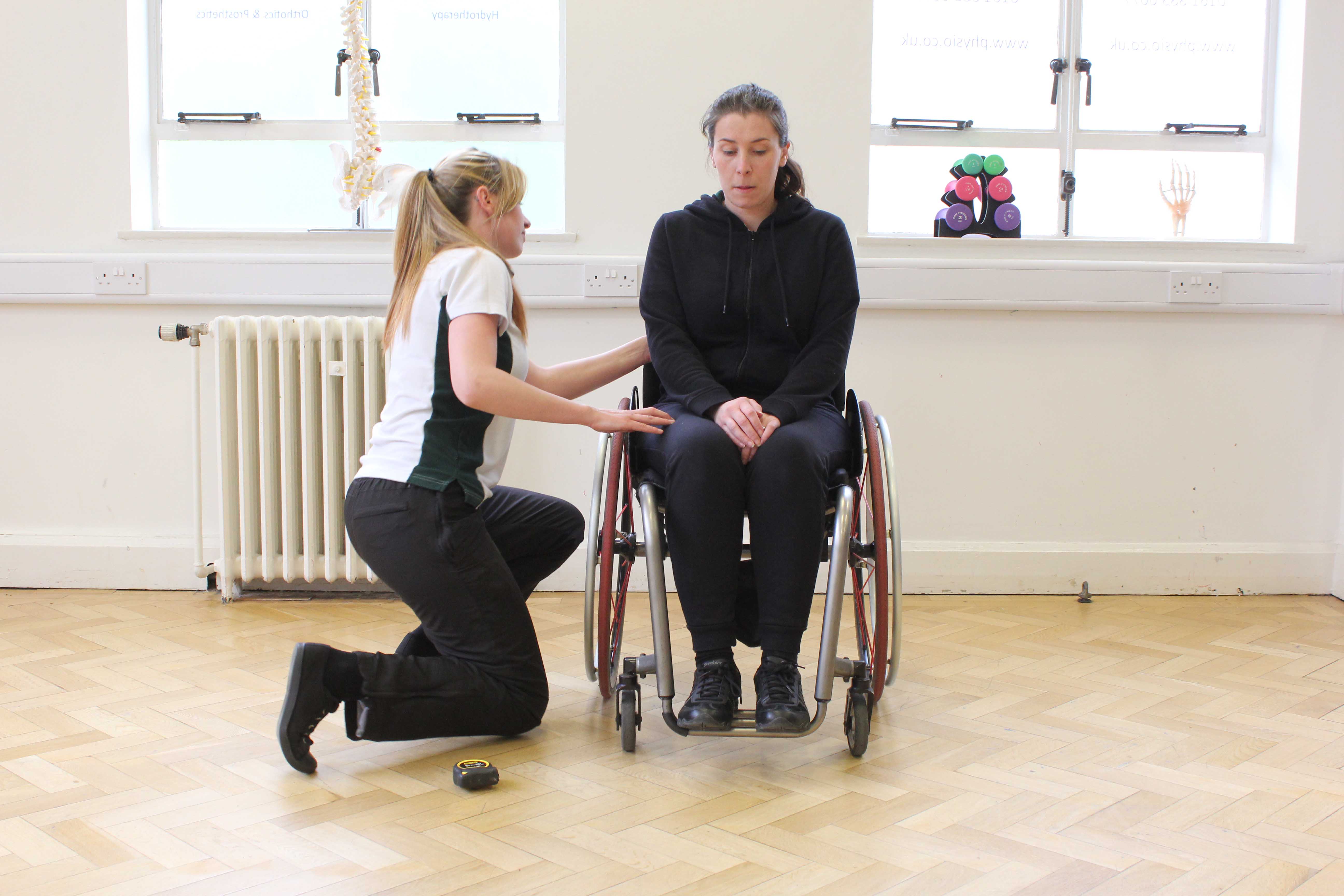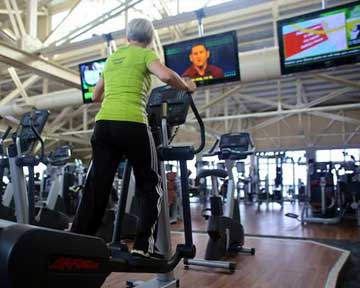Spinal cord injury (SCI) is typically defined as injury to the spinal cord resulting in either reduced mobility or sensation. Partial or complete SCI results in the reduction or loss in mobility and sensation.
Physiotherapy treatment is able to help you reach your maximum physical potential dependent upon your symptoms and personal goals. The specialist neurological physiotherapists at Liverpool Physio are experts in the field of spinal cord injury and can enable you to reach your goals whether you?ve recently been diagnosed or have been living with SCI for some time.
Spinal cord injury is damage to the spinal cord which results in either reduced mobility, sensation or both.
The spinal cord is made up of millions of nerve fibres responsible for transmitting information from the brain to the rest of the body and back again.
Injury to the spinal cord causes a variety of different symptoms depending upon the spinal level the injury has occurred at.? Generally speaking, the closer the injury is to the brain the more severe the disability however this depends upon whether the injury to the cord is complete or incomplete.
Complete lesion of the spinal cord means that all function, voluntary movement and sensation are lost on both sides of the body below the level of the lesion.
Incomplete lesion varies in severity depending on which parts of the spinal cord have been damaged. You may have more function on one side of the body than the other or be able to feel a body part but not move it and vice versa.
 Above: Rehabilitation following a spinal cord injury.
Above: Rehabilitation following a spinal cord injury.
Spinal cord injury can be caused by a number of things but the most common cause is a trauma such as a road traffic accident.
Other causes include:
Spinal cord injury can be diagnosed in a number of ways. These include:
 Above: Hydrotherapy is an effective treatment for spinal cord injury.
Above: Hydrotherapy is an effective treatment for spinal cord injury.
There are a number of problems associated with spinal cord injury that physiotherapy can help with. Specific physiotherapy treatment for those with spinal cord injury can vary depending upon the symptoms experienced.
Our specialist neurological physiotherapists are experts at assessing your condition and creating treatment plans tailored to your own individual goals.
Physiotherapy can help with:
Physiotherapy is very important following spinal cord injury to increase your function and independence.
Physiotherapy rehabilitation following SCI will begin at hospital in order to maximise independence and it is important to continue this in order to encourage any movement possible through a combination of strengthening, stretching, sensory perception work, visual feedback and positive reinforcement.
 Above: Our physiotherapist ensuring her patients wheelchair is adjusted correctly to support her patients posture.
Above: Our physiotherapist ensuring her patients wheelchair is adjusted correctly to support her patients posture.
Physiotherapy is able to:
Your treatment will have begun with physiotherapy input at hospital but, considering the life changing effect SCI has, it is important to ensure that you reach your maximum physical potential by building on that initial treatment. Progress following an incomplete lesion of the spinal cord can continue for months, if not years and even following a complete lesion it is essential to learn the skills Liverpool Physio can teach you in order to maximise your movement potential and prevent complications.
Treatment for SCI can vary significantly depending on which spinal level has been affected and the severity of your symptoms; however our physiotherapists will always carry out a detailed assessment prior to treatment to ensure you get maximal benefit from the sessions.
Treatment sessions can include:
Liverpool Physio are able to offer assessment and treatment sessions either at our specialist clinic or in the comfort of your own home dependent on your needs and can provide medical reports if required.
If you feel that you may benefit from assessment by one of our specialist physiotherapists please contact Liverpool Physio at office@liverpoolphysio.co.uk or call our team on 0151 558 0077 to book an appointment at your convenience.
A spinal cord injury can cause significant problems to your mobility and/or sensation. Injury to the spinal cord is not limited to these symptoms and can also present with a number of other difficulties, consequently having a dramatic impact on quality of life.
Physiotherapy is vital for post injury rehabilitation. Our physiotherapists are highly experienced in meeting your needs, however complex. They can provide a wide range of treatment methods to ensure you achieve your maximum potential and maximum quality of life.
To book call Liverpool Physio today on 0151 558 0077 or e-mail the team at office@liverpoolphysio.co.uk
↑ Back to top
Physiotherapy treatment is able to help you reach your maximum physical potential dependent upon your symptoms and personal goals. The specialist neurological physiotherapists at Liverpool Physio are experts in the field of spinal cord injury and can enable you to reach your goals whether you?ve recently been diagnosed or have been living with SCI for some time.
What is SCI?
Spinal cord injury is damage to the spinal cord which results in either reduced mobility, sensation or both.
The spinal cord is made up of millions of nerve fibres responsible for transmitting information from the brain to the rest of the body and back again.
Injury to the spinal cord causes a variety of different symptoms depending upon the spinal level the injury has occurred at.? Generally speaking, the closer the injury is to the brain the more severe the disability however this depends upon whether the injury to the cord is complete or incomplete.
Complete lesion of the spinal cord means that all function, voluntary movement and sensation are lost on both sides of the body below the level of the lesion.
Incomplete lesion varies in severity depending on which parts of the spinal cord have been damaged. You may have more function on one side of the body than the other or be able to feel a body part but not move it and vice versa.
 Above: Rehabilitation following a spinal cord injury.
Above: Rehabilitation following a spinal cord injury.What causes a SCI?
Spinal cord injury can be caused by a number of things but the most common cause is a trauma such as a road traffic accident.
Other causes include:
- Falls
- Sports injuries
- Penetration injuries
- Diseases e.g. Cancer, arthritis, osteoporosis, spina bifida
- Infection
How is SCI diagnosed?
Spinal cord injury can be diagnosed in a number of ways. These include:
- Medical Examination
- X-Ray
- Computerised Tomography (CT) Scan
- Magnetic Resonance Imaging (MRI) Scan
 Above: Hydrotherapy is an effective treatment for spinal cord injury.
Above: Hydrotherapy is an effective treatment for spinal cord injury.What problems caused by SCI can physiotherapy help with?
There are a number of problems associated with spinal cord injury that physiotherapy can help with. Specific physiotherapy treatment for those with spinal cord injury can vary depending upon the symptoms experienced.
Our specialist neurological physiotherapists are experts at assessing your condition and creating treatment plans tailored to your own individual goals.
Physiotherapy can help with:
- Reduced strength
- Reduced balance and coordination
- Poor posture
- Walking education
- Skin care education
- Decreased mobility
- Changes in muscle tone
- Stiff joints
How does physiotherapy help SCI?
Physiotherapy is very important following spinal cord injury to increase your function and independence.
Physiotherapy rehabilitation following SCI will begin at hospital in order to maximise independence and it is important to continue this in order to encourage any movement possible through a combination of strengthening, stretching, sensory perception work, visual feedback and positive reinforcement.
 Above: Our physiotherapist ensuring her patients wheelchair is adjusted correctly to support her patients posture.
Above: Our physiotherapist ensuring her patients wheelchair is adjusted correctly to support her patients posture.Physiotherapy is able to:
- Increase quality of life
- Increase independence
- Increase ability to carry out normal activities of daily living
- Increase muscle strength
- Reduce Pain
- Reduce muscle stiffness
- Reduced risk of chest infections
- Reduce fatigue
What would physiotherapy treatment for SCI involve?
Your treatment will have begun with physiotherapy input at hospital but, considering the life changing effect SCI has, it is important to ensure that you reach your maximum physical potential by building on that initial treatment. Progress following an incomplete lesion of the spinal cord can continue for months, if not years and even following a complete lesion it is essential to learn the skills Liverpool Physio can teach you in order to maximise your movement potential and prevent complications.
Treatment for SCI can vary significantly depending on which spinal level has been affected and the severity of your symptoms; however our physiotherapists will always carry out a detailed assessment prior to treatment to ensure you get maximal benefit from the sessions.
Treatment sessions can include:
- Exercises and stretches
- Teaching transfers
- Strengthening work
- Activities to increase coordination and balance
- Advice for you and those caring for you about manual handling
- Teaching wheelchair skills
- Breathing exercises & chest clearance techniques
- Hydrotherapy
- Provision of appropriate equipment such as splints and orthotics
- Provision of individualised home exercise programmes
Liverpool Physio are able to offer assessment and treatment sessions either at our specialist clinic or in the comfort of your own home dependent on your needs and can provide medical reports if required.
How do I arrange a physiotherapy assessment following spinal cord injury?
If you feel that you may benefit from assessment by one of our specialist physiotherapists please contact Liverpool Physio at office@liverpoolphysio.co.uk or call our team on 0151 558 0077 to book an appointment at your convenience.
Summary
A spinal cord injury can cause significant problems to your mobility and/or sensation. Injury to the spinal cord is not limited to these symptoms and can also present with a number of other difficulties, consequently having a dramatic impact on quality of life.
Physiotherapy is vital for post injury rehabilitation. Our physiotherapists are highly experienced in meeting your needs, however complex. They can provide a wide range of treatment methods to ensure you achieve your maximum potential and maximum quality of life.
To book call Liverpool Physio today on 0151 558 0077 or e-mail the team at office@liverpoolphysio.co.uk
↑ Back to top
















